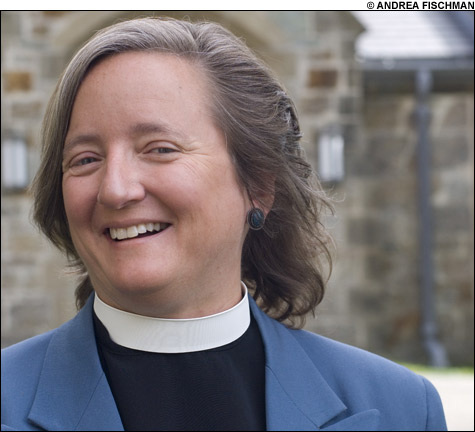
PRO-CHOICE PROVOCATEUR: Reverend Katherine Ragsdale, who next month will become president and dean of Cambridge's Episcopal Divinity School, is an abortion-rights champion — and bête noire to the right. |
Last month, in his controversial commencement speech at the University of Notre Dame, Barack Obama urged pro-choice and pro-life Americans to seek common ground. "Maybe we won't agree on abortion," Obama said. "But we can still agree that this is a heart-wrenching decision for any woman to make, with both moral and spiritual dimensions." Thirteen days later, Scott Roeder allegedly walked into Reformation Lutheran Church, in Wichita, Kansas, and fatally shot Dr. George Tiller, a provider of late-term abortions, who was serving as an usher at the time.
Tiller's slaying highlights just how difficult it will be for Obama to realize his vision (the recent nomination of abortion-rights cipher Sonia Sotomayor to the Supreme Court notwithstanding). But it also raises a vexing question in the war over abortion, is the search for common ground the solution or part of the problem?
No one makes the latter case more forcefully than Katherine Ragsdale, an Arlington resident who'll become dean of Cambridge's Episcopal Divinity School next month. When Ragsdale's appointment was announced this past March, it triggered a torrent of fear and loathing among religious conservatives. Midwest Conservative Journal editor Christopher Johnson, for example, dubbed Ragsdale "Rev. Mengele." And writing for World Magazine, Marvin Olasky — the driving intellectual force behind George W. Bush's stated policy of "compassionate conservatism" — was moved to prayer: "May God have mercy," he said of Ragsdale, "on her, on her students, and on all of us."
Some of this venom almost certainly stemmed from the fact that Ragsdale is a lesbian. But the primary source of consternation was a 2007 speech Ragsdale gave in defense of abortion rights in Birmingham, Alabama, following a failed push by anti-abortion protesters to shut down a clinic.
In her Birmingham address, Ragsdale panned the unwillingness of some medical personnel to be involved with abortions, and lamented what she called the patronizing attitude abortion opponents take toward women. Next, she took vigorous issue with the notion that there's anything regrettable about the act of abortion itself. The passages in question bear quoting in their entirety:
Let's be very clear about this: when a woman finds herself pregnant due to violence and chooses an abortion, it is the violence that is the tragedy; the abortion is a blessing.
When a woman finds that the fetus she is carrying has anomalies incompatible with life, that it will not live and that she requires an abortion — often a late-term abortion — to protect her life, her health, or her fertility, it is the shattering of her hopes and dreams for that pregnancy that is the tragedy; the abortion is a blessing.
When a woman wants a child but can't afford one because she hasn't the education necessary for a sustainable job, or access to health care, or day care, or adequate food, it is the abysmal priorities of our nation, the lack of social supports, the absence of justice that are the tragedies; the abortion is a blessing.
And when a woman becomes pregnant within a loving, supportive, respectful relationship; has every option open to her; decides she does not wish to bear a child; and has access to a safe, affordable abortion — there is not a tragedy in sight — only blessing. The ability to enjoy God's good gift of sexuality without compromising one's education, life's work, or ability to put to use God's gifts and call is simply blessing.
These are the two things I want you, please, to remember — abortion is a blessing and our work is not done. Let me hear you say it: abortion is a blessing and our work is not done. Abortion is a blessing and our work is not done. Abortion is a blessing and our work is not done.
It is, of course, those last two paragraphs that really stand out. Many abortion-rights supporters now concede, like Obama, that abortion itself is an emotionally fraught act — something that most women would probably prefer not to have to do. (In 2005, for example, Hillary Clinton marked the 32nd anniversary of Roe v. Wade by stating that abortion "in many ways represents a sad, even tragic, choice.")
In the aforementioned passages, however, Ragsdale takes precisely the opposite tack. Even when a pregnant woman enjoys the best possible circumstances, she's suggesting, the act of aborting a fetus isn't an occasion for ambivalence or guilt. It is, instead, an unfettered good — something to be cherished and celebrated.
That's a provocative line of argument — and it, too, invites some thorny questions. If more abortion-rights supporters reasoned like Ragsdale, for example, would the pro-choice cause be weaker or stronger? And would abortion's most aggressive opponents be less emboldened — or even more likely to lash out?